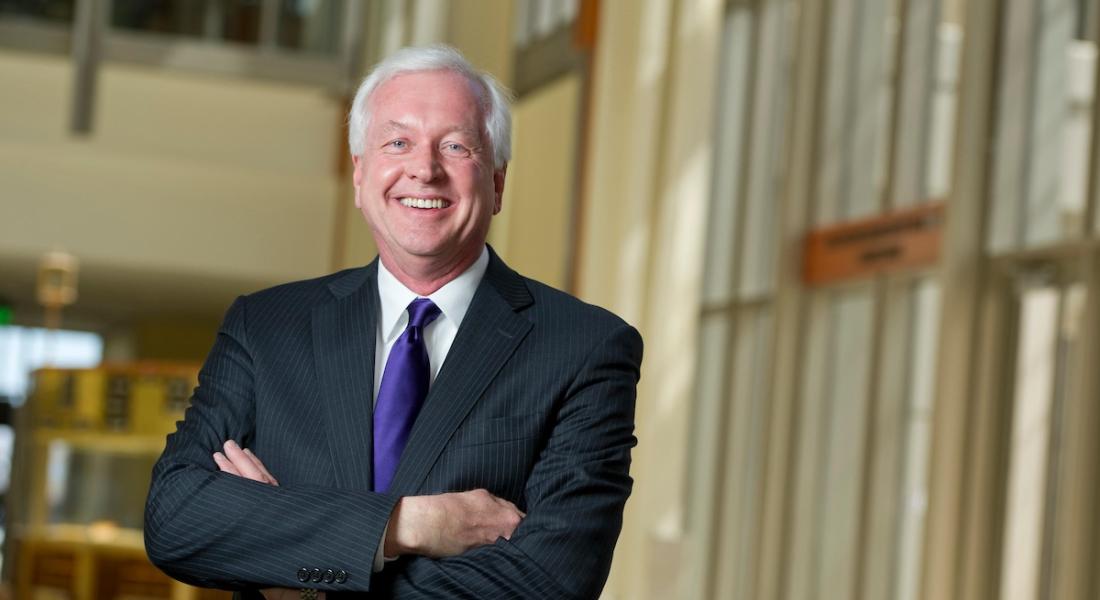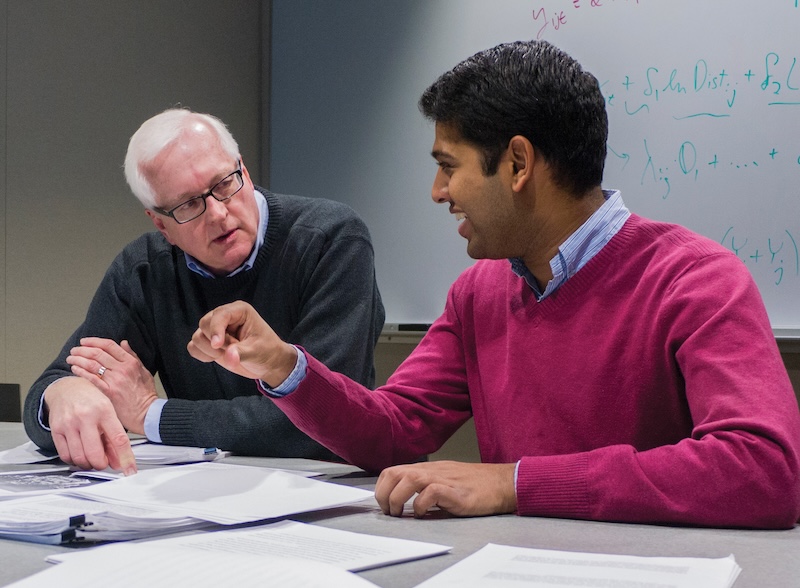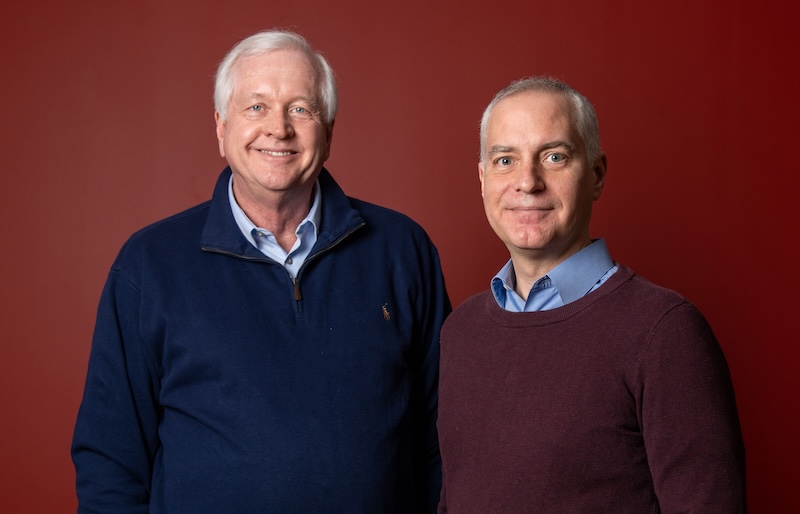
After 38 years as a University of Notre Dame professor and 26 years as a Kellogg faculty fellow, Jeffrey H. Bergstrand, professor of finance in the Mendoza College of Business, concurrent professor of economics in Arts and Letters, and concurrent professor in the Keough School of Global Affairs, will retire at the end of the academic year. He was honored in April for his long and influential career with a conference called “Gravity, Trade Agreements, and Policy: Celebrating Contributions of Jeff Bergstrand” funded by Kellogg, the Department of Economics, and the Mendoza College of Business.
Bergstrand is among the top 2% of economists worldwide and among the top 1% of trade economists, according to RePEc (a decentralized database of working papers, publications, and software contributions that also provides scholar rankings). Colleagues from across campus, the United States, and the globe – from the United Kingdom, Netherlands, Spain, Germany, South Africa, and Brazil – attended the conference to celebrate Bergstrand’s significant academic and policy contributions.
“Jeff has built a research community across the world. It speaks to his personality, but also to the strength of his work. Reflecting Jeff’s amazing status and visibility in the profession, we had some of the top international trade economists coming to this conference, some of Jeff’s contemporaries, some of his younger co-authors, and people in between,” says Thomas A. Gresik, Kellogg faculty fellow and professor of economics who organized the conference along with two of Bergstrand’s co-authors, Scott L. Baier, professor of economics at Clemson University and Yoto V. Yotov, professor of economics at Drexel University, and another colleague, Tibor Besedes, professor of economics at Georgia Tech.
Research Contributions
Bergstrand’s research on the Gravity Equation, free trade agreements, and foreign direct investment trade flows has been cited more than 21,000 times – a high number for any discipline and especially high in economics. According to the Review of Economic Statistics, Bergstrand’s article published in 1985, “The Gravity Equation in International Trade: Some Microeconomic Foundations and Empirical Evidence" (cited 5001 times), is the eighth most-cited article over the journal’s more than 100-year history and is its most-cited paper of the 1980s.
 In addition to his foundational contributions to the theoretical and empirical applications of the gravity model, Bergstrand also provided a stylized model explaining the factors that would likely influence countries to enter into a free trade agreement in his paper “Economic Determinants of Free Trade Agreements.” His second most cited paper “Do Free Trade Agreements Actually Increase Members’ International Trade” (cited 3,589 times) marked a turning point in how economists and policymakers assessed the efficacy of free trade agreements by providing an econometric method to analyze ex post the quantitative impacts of free trade agreements on country-pairs' trade flows, providing consistent and precise estimates of the effects. This model is also used to estimate the economic welfare gains from such agreements.
In addition to his foundational contributions to the theoretical and empirical applications of the gravity model, Bergstrand also provided a stylized model explaining the factors that would likely influence countries to enter into a free trade agreement in his paper “Economic Determinants of Free Trade Agreements.” His second most cited paper “Do Free Trade Agreements Actually Increase Members’ International Trade” (cited 3,589 times) marked a turning point in how economists and policymakers assessed the efficacy of free trade agreements by providing an econometric method to analyze ex post the quantitative impacts of free trade agreements on country-pairs' trade flows, providing consistent and precise estimates of the effects. This model is also used to estimate the economic welfare gains from such agreements.
“The way the model produces consistent predictable results, the robustness of it, and how quickly you can get the results makes it kind of the go-to model, not just for economists, but for policy people as well,” says Baier, who co-authored the paper with Bergstrand. “This approach to thinking is incredibly influential in Washington DC in terms of a public engagement; it was incredibly influential in the Brexit debate.”
Kellogg and Policy Work
As a result of his foundational scholarly work, Jeff has consulted with the United States International Trade Commission and has been invited to the White House to discuss US trade policy. His work is frequently referenced in the annual Economic Report of the President in the chapter on international issues. The influence of his work extends beyond the United States. Jeff has worked with the Swiss government and the European Union. Moreover, his approach to modeling trade agreements is applied within government agencies across the world.
 “Kellogg creates an environment where someone with such a strong interest in international issues, policy, and research can thrive, and they were just incredibly supportive when I wanted to bring in top speakers in international development, mostly international trade people from throughout the country, and sometimes from abroad,” says Bergstrand. “Kellogg has maintained – substantively, mentally, and in my heart – the importance of international work and of doing work to support the principle that we all live on one planet, and trade is important to bind people together, to help maintain peace.”
“Kellogg creates an environment where someone with such a strong interest in international issues, policy, and research can thrive, and they were just incredibly supportive when I wanted to bring in top speakers in international development, mostly international trade people from throughout the country, and sometimes from abroad,” says Bergstrand. “Kellogg has maintained – substantively, mentally, and in my heart – the importance of international work and of doing work to support the principle that we all live on one planet, and trade is important to bind people together, to help maintain peace.”
“Jeff has made invaluable contributions to his field, to the policy world, and to the Kellogg Institute through the years,” shares Institute Director Aníbal Pérez-Liñán. “At Kellogg, he has always been generous in sharing his ideas and feedback, and his work with students through the Kellogg International Scholars Program has been exceptional.”
Bergstrand originated the idea of the Policy and Practice Research Labs at Kellogg and has had a Kellogg-funded lab, the Initiative on International Economic Integration Lab (IIEI), since 2019. In 2021, Bergstrand organized a virtual conference with the USITC and the Keough School of Global Affairs called “Deep Trade Agreements: Measurement and Impacts.”
He served on Kellogg's Faculty Committee from 2001 to 2005 and then continuously from 2007 to the present and was the acting director of Kellogg during the spring semester of 2018.
“Jeff’s been a great citizen of the university,” says Gresik. “He’s been instrumental in making Kellogg what it is today. He’s a good model for others.”
Teaching and Mentorship
Bergstrand is known for his enthusiasm for teaching and mentoring students.
“Across the board he has had a strong positive influence, not just on the trade literature and practice, but on people,” says Gresik. “Though he’s not formally in the economics department, Jeff has a courtesy appointment, and he’s worked with our graduate students and supervised some dissertation work. Not only is Jeff a brilliant scholar, he has always been willing to give of himself to help other people advance in their careers.”
 He’s taught more than 10,000 students in the Mendoza School of Business.
He’s taught more than 10,000 students in the Mendoza School of Business.
“I want to share my enthusiasm for how the international economy works. We have just incredibly bright undergraduates, MBAS, and executive MBAs,” says Bergstrand. “Our responsibility is to have them make better business decisions, and informed business decisions, and give them an understanding of economics so that they understand the big picture. It’s just a wonderful feeling to know you helped influence their lives and helped put them on a successful trajectory, adding scholars to the world.”
Bergstrand also has mentored 16 students in Kellogg’s International Scholars Program, more than any other faculty fellow has. Many of these undergraduates have helped him create and maintain two comprehensive databases, one focused on bilateral trade agreements, the other on revenue, employment, and investment in multinational enterprises, for nearly every country.
Databases
The NSF-Kellogg Institute Data Base on Economic Integration Agreements and the Multinational Revenue, Employment, and Investment Database (MREID) are both used by researchers and policymakers around the world.
 “The scarcity of quality databases hampers the progress of science,” says Jordi Paniagua, associate professor of economics at the University of Valencia and Kellogg Distinguished Research Affiliate, who worked with Bergstrand in the IIEI lab and is writing a paper with him on the effects of deep trade agreements’ provisions. “Bergstrand has provided an invaluable public service in this regard. For more than 15 years, he has maintained the most complete database of economic integration agreements.”
“The scarcity of quality databases hampers the progress of science,” says Jordi Paniagua, associate professor of economics at the University of Valencia and Kellogg Distinguished Research Affiliate, who worked with Bergstrand in the IIEI lab and is writing a paper with him on the effects of deep trade agreements’ provisions. “Bergstrand has provided an invaluable public service in this regard. For more than 15 years, he has maintained the most complete database of economic integration agreements.”
Paniagua and Bergstrand worked with the USITC to develop the MREID database in 2021 and 2022.
“It’s a public good to all researchers that’s been a major accomplishment that we did over the past couple of years,” says Bergstrand. “I’m amazed looking back that I’ve been able to manage these two databases, which are both free to researchers and policymakers. I’m immensely honored to have been able to do that alongside my other research.”
Retirement
When Bergstrand retires at the end of May, he will be named professor emeritus and continue working on three ongoing research projects.
“Two are more work on trade flows, new methodologies to try to estimate better and better, the effects of free trade agreements on trade flows, which then are used to determine economic welfare. They both introduce new methodologies to better estimate impacts across the distributions of all trade flows,” says Bergstrand. “In another paper with Jordi Paniagua, we’re estimating the effects of deep trade agreement provisions. We’re getting more and more granular estimates of which groups of provisions increase or decrease trade or foreign direct investment.”
Since time will be freed up when he’s done teaching at the end of May, Bergstrand also plans to spend more time with his family, traveling, and exercising.
“I grew up in the Chicago area, my wife in Cleveland, we’re smack dab between the two. We like the climate here, we like the change of seasons, we have no plan to move out of the region,” he says. “We just want to take advantage of all the things that South Bend and the University have to offer.”
The Kellogg Institute for International Studies, part of the Keough School of Global Affairs at the University of Notre Dame, is an interdisciplinary community of scholars and students from across the University and around the globe that promotes research, provides educational opportunities, and builds partnerships throughout the world on the themes of global democracy and integral human development.





